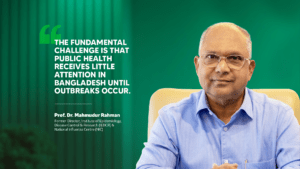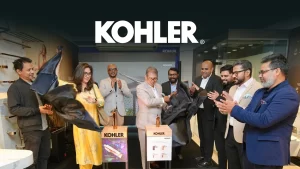Currently working as the Deputy Country Chief for Mashreq Bank, Fahmida Sharmeen has left a great trail to follow wherever she has set foot in.
It wasn’t all smooth sailing for this woman of steel. But she conquered odds that would break almost anybody else.
Read about her plight against cancer, work-place discrimination and uncertainty.
1. Tell us about your academic background, experiences as a banker and how you started your career.
I went to Holy Cross School and College, and completed everything up until my HSC examinations from there.
I wanted to be an architect straight out of college, because of my innate knack for painting. Painting was something I inherited from my mother. During my years at Holy Cross, I participated in arts and crafts competitions and exhibitions, both performing arts and handicrafts.
I painted to such an extent, that my paintings got selected and shipped to art exhibitions in U.S.A, and never made their way back to me.
My cousin first planted the ‘getting into IBA’ seed in my mind.
Since, I wanted to do things faster; I opted for B.Com, and graduated 2 years earlier than all of my peers who were pursuing their undergraduates. I instantly sat for my M.B.A entrant exams at IBA, and voila! By the grace of Almighty Allah, I was in.
I never really fancied banking. I wondered how people could only work with numbers all their lives.
I was always under the impression that banking was something someone as creative as me couldn’t pursue a career in.
Standard Chartered had a position open that 3000 people were competing for around the time I graduated with my MBA from IBA. Back then, there were no open recruitments. A friend of mine from IBA referred me for the preliminary interview. I went through six interviews. I faced divisional heads, regional heads and the British Chief of Standard Chartered bank during these interviews.
I was pitted against three finalists, a senior from IBA who topped her batch in the marketing department and another very strong candidate.
I was quite nonchalant during the waiting period, since I had given it my best shot.
Well, guess what? Voila again!
They called me and let me know that I was in.
2. What does your routine look like on weekdays and weekends?
I pray, first thing in the morning, spend some time with myself in solitude in my car while travelling to and from work, because it’s a four hour journey every day, I try and make the best out of it.
I make up for all of that on weekends by having breakfast with my sisters and nieces and catching up with my parents and friends afterwards.
3. Describe yourself in three words.
‘Ethical’
‘Moral’
‘Adamant’
Throughout my career, I have been fortunate enough for not having to compromise on my ethical ground or morality.
The professional side of me is just one of the many personas I carry. I was a born painter, I used to write, learned classical dancing and I was into singing. I’ve always been involved with exciting things. I was into sports, and if you asked me to name a few sports I didn’t participate in, the list would be extremely small. I played baseball, basketball, volleyball, cricket, football and table tennis.
Nowadays, I only get to play table tennis, which my office was kind enough to arrange for us on special request.
4. Who’s your favorite author? Local & International.
I’ve always loved Tagore.
And even though, Shakespeare’s work might seem medieval to many, I’ve always loved his work.
5. Most watched film/TV show.
I used to love watching the “Bionic Woman” on television. The reason I liked it so much is because as a child, I wanted to be able to do everything she does. And I believe, I have stuck to that philosophy to some extent. I might not have gone bionic, but I managed to go sky-diving.
6. Gender disparity in the workplace.
Gender disparity is common in the workplace because of the stigma associated with being a woman. I had to work extra hard to eliminate the presumption people already had about me just because I was a woman. I never compromised with anything and always went the extra mile.
“I did a lot more than guys did, just so they couldn’t compare themselves with me. That’s how I’ve come up to this level and managed to stay at it”.
My team members don’t see me as a man, or a woman, they just see me as their leader.
7. Do you do anything outside of your workplace?
I do charity in a very minimal way and that is one area where I want to do a lot more. I have a much bigger plan that is beyond my professional life. I’m working with Kazi Sarwar Hasan, who is an environmental engineer. We’re working together to turn waste water into drinking water. I have witnessed a lot of hardship over the years during floods, and I truly believe we can do more to make life easier for people in the face of natural disasters together.
8. What song defines your true self?
If I were to define myself with music, I’d have to name about twenty songs. So, I’d rather pick one song which touches my heart whenever I play it myself. It’s Jagjit Singh and Chitra Singh’s “Woh Kagaz Ki Kashti”. It has stayed with me.
9. How do you cope with all the pressure?
What gives me strength are my prayers (five times a day, 365 days a year) – it’s more than meditation. Furthermore, I’m not a person who is very serious. We cut jokes in the office, laugh and listen to music. I can be my true self when I am with my Mashreq team. Other than that, My family is my strength; my niece, my sisters, my parents and of course my friends. They are the ones who keep me going.
10. What challenges did you face in your career?
If I had to highlight challenges in my career, I would definitely have to go back to my time in correspondent banking under Mr. Mamunur Rashid, Ex-C.E.O of Citi Bank Bangladesh. We used to cater to local banks. So to speak, we were the bank of all banks. During one of my initial days, my boss called me at 9 A.M and asked me to interview the then Deputy Governor for Bangladesh Bank, Managing Director for Sonali Bank and the Managing Director for a private bank and prepare a report on the after-effects of the most recent flood to have hit Bangladesh at that point in time. The dead-line for which was on the same day, 4 P.M
I took their numbers and made appointments, and didn’t take anyone’s help. I directly went to take their interviews and sat down to write the report at 4 P.M. I mailed the report to my boss at 5.45PM and left early that day, I was very frightened because I had missed the deadline.
When I opened my computer the next morning, I saw that my boss had forwarded the email to the head of press in London saying, “This is one of the brightest officers in my team; very energetic, very dynamic, very intelligent, she has developed this entire report after interviewing all of these individuals in just one day.”
Two weeks later, Mr. Mamunur Rashid emailed me saying that I was to travel to London, to further work on the report, in 1999. My objective was to convince the people in London that the flood really did have dire impacts in our country. So, I invited them to Bangladesh and took them to the governor, bankers and economists. Once they came down, they were convinced. After that, the whole scenario changed. I still can’t believe how I did all that.
I will forever be grateful to this man for giving me the opportunity to push myself and perform under pressure. I worked the hardest I have ever worked in my life in the two years I worked under him. But I strongly believe that, what those two years and Mr. Mamunur Rashid taught me have been my most precious learning experiences.
After working under Mr. Mamunur Rashid for two years, I was appointed under someone else. You know how it works, bosses change.
At some point in time, the person I was working for was out to ruin me with a vengeance. I wasn’t too keen on how my new boss handled things. Albeit of everyone in the office feeling the same way, I was the only one willing to stand up against him. Can you imagine a senior at work plotting against you? I faced all of that because of a personal clash. I was the only one in the office opposing him, and it got harder and harder for me every day for an entire year. But, at the end of it all, I emerged victorious.
11. Tell us about your career in brief.
I had been in the same department for some time when an opportunity came up in Singapore. No one could apply for the Singapore region from Bangladesh but Mr.Mamunur Rashid suggested that I apply. I did as I was told and applied; the interview went on for three phases. In between, I passed the CSA exam, a skill assessment test, as the first woman from Standard Chartered Bank.
After that, on a fine morning, I was notified that I was selected for the position in Singapore I had applied for. I was the first Bangladeshi ever to be selected for that position in Singapore.
In a matter of some time, one of the 21st Century’s most horrendous terrorist attacks gripped the world. 9/11 doomed upon us. Upon which, Mr. Rumee Ali, called me back for a high network segment in 2003- total consumer banking. That’s how I moved into priority banking in Standard Chartered Bank.
I moved to consumer banking at IPDC Finance Limited as head of consumer banking for one and a half years.
While I was still in IPDC, I got an offer from Mashreq Bank, the largest private bank in Dubai for the Deputy Country Chief position. I was interviewed and finally selected for the position in 2011.
If you ask me, “Do you like your job?” I would say I’m passionate about my job. I do nothing half-heartedly. I’m passionate about every single thing I am committed to.
12. Some memories of your illustrious career.

There was an Iron-Man concept in Standard Chartered Bank. They wanted us to exceed the limit and go the extra mile. For the first time for SCB, a huge event took place in Jeju island, Korea. They wanted every country to perform dance routines in groups but Bangladesh never participated in that kind of a thing. Osman, the regional head, knew that I could dance and asked if I would do it. I asked for a permit to bring my dance guru with me and arranged for a team of ten dancers to practice regularly. We sent the final performance video to them in hopes of being selected in the top ten countries list. There were 3000 bankers from 15 or 16 countries. Bangladesh got shortlisted as one of the top ten countries. The top 10 had to perform at the convention center in Jeju island where the Olympics took place. Everyone had to wear their traditional dresses to the gala dinner. With the aid of my creativity, I designed my attire with Jamdani; there were three women in the team.
In the judge’s panel, there were five directors. They called out 8 names and the eighth female name was Bangladeshi: me. Someone was whistling; it was so noisy. The first order of business was introducing myself, followed by a catwalk, followed by a question answer session leading up to a catwalk. I used to be a ramp model at the age of sixteen, and I am quite well-versed in music. It was nothing for me. The most important thing was audience votes, and the moment I stepped up to the stage, the whole hall broke down and the majority of the people started voting for me. The best-dressed male was Pakistani and the moment they announced that the best-dressed female was from Bangladesh (me), everyone stood in awe. I will never forget that moment.
I owe everything I have learnt till date to Standard Chartered Bank. I’m only trying to contribute whatever I have learned from there to other people right now.
13. What do you look for most in a candidate/CV/Applicant?
When we look at a CV, we look to see if the candidate is switching too much. We’re not comfortable with that. I like to know about the person when hiring. Are they just bookish or dynamic? What kind of lifestyle do they pursue? If they’re family oriented or not, their strengths and weaknesses. I don’t usually look for people with just good grades. If we were to make a list of successful individuals all across the world, the list would mostly comprise of mediocre students. When it comes to recruitment, I always look for team players.
“I believe in we, instead of I”
14. How does an ideal meeting look for you?
I always keep very short points that need to be discussed. I strictly make it a point, to revert back to our discussion when conversation starts to go astray. We allocate time for conversation after reaching our meeting objectives.
I highly value deadlines. It is one of the most important things in life to me. If I promise I will deliver, by hook or by crook, I shall deliver. Same goes for the people I hire, I try to understand if they are capable enough to hold up their end of the bargain or not.
“I remember going to work with a mask on, in the middle of receiving chemo therapy for cancer. I showed up, I did my best.”
15. What were some of the darkest times in your life, and how did you manage to fight back?
My darkest hours had to be during my cancer journey. I didn’t know if I was going to make it or not – I just fought back. My sister and my niece are the closest to my heart. When they got to know about my diagnosis, my sister broke down. But I stayed strong. They’ve never seen me shed a tear. I kept telling myself “Allah, you’ve given me an exam, give me the strength to pass it.” One of the major side-effects of cancer is severe diarrhea. I kept vomiting continuously. Just transparent fluids. One of my closest friends, Nazlee Siddiqui came to look after me during such a hard time all the way from Sydney.
My parents didn’t know that I suffered from cancer at the time I was fighting it. I couldn’t tell them because I didn’t want them to have that on their minds. During the chemo, I couldn’t go to meet them because they would understand. It’s not because I didn’t want people to know; I just did not want to trouble them with it. But, now that I have managed to fight it off, I finally managed to tell them that I survived cancer.
I have always done what I wanted to do, and I’m glad Allah has blessed me with the power to do so.






